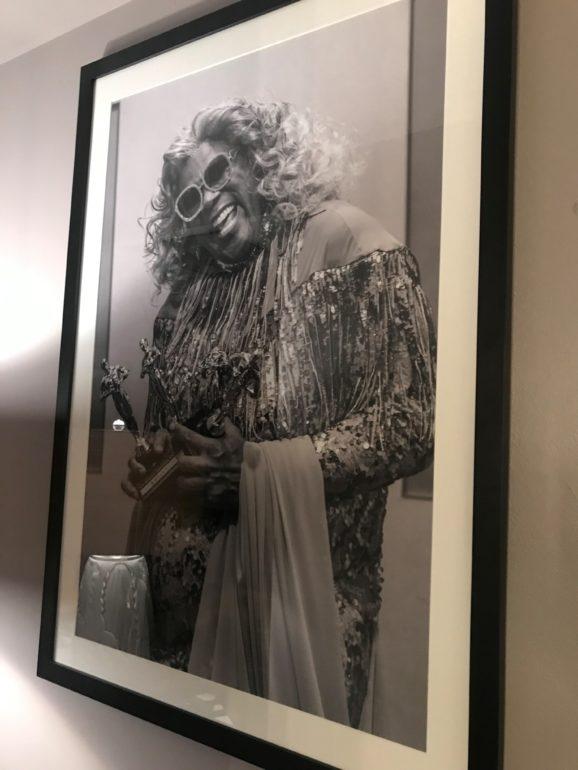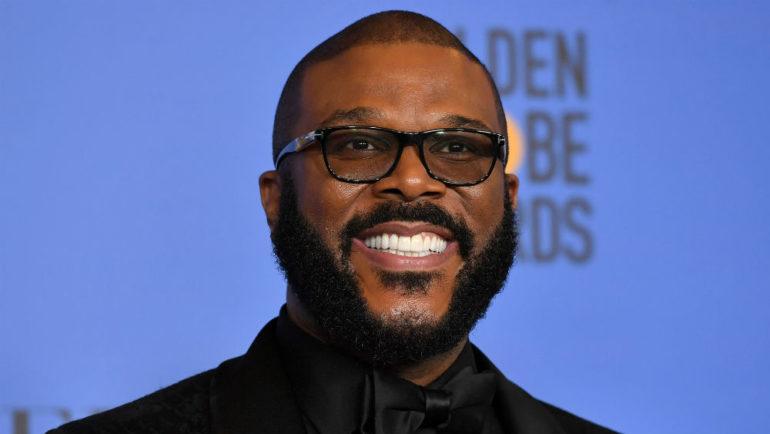Tyler Perry on Saying Goodbye to Madea, Calling Colin Powell and Reading Reviews
By Jenelle Riley
LOS ANGELES (Variety.com) – Mabel “Madea” Simmons was never meant to be a phenomenon. Her creator, Tyler Perry, owes the success of the character in part to his mother and aunts, who she is based on, but also to an actress who didn’t show up to perform a role in his play, “I Can Do Bad All By Myself.”
Perry recalls that night at the Regal Theater in Chicago. “It was an actress with a hit song on the radio, and she didn’t show up. I was playing Madea, who was only supposed to be on stage for two minutes, but I ended up incorporating the lines from the other character and being on stage for the whole time.”
Perry felt so bad that he had been advertising the appearance of this actress that after the show he tried to apologize to the audience. “They were chanting: ‘We don’t care! We don’t care! We want Madea!’” Perry laughs and adds, “To look at it from there to here, I really fell into it. This was meant to be.”
The “here” Perry refers to is backstage at the 3,400-seat Dolby Theatre in Los Angeles, where the writer/actor/director/producer/mogul has just completed a performance of “Madea’s Farewell Play Tour” to a raucous, sold-out crowd. The likes of Vin Diesel and Tiffany Haddish have already come to the show and later that night, Beyonce and Jay-Z will pay a visit. On this particular Saturday, Perry will perform the show three times to sold out houses, prompting the Dolby Theatre to note, “In the 17 years we’ve been in business, no artist has ever had 10,000 people in this building in a single day!”
The green room at the Dolby is lined with black-and-white photos of some of the biggest names in the business holding their Oscars, from Robin Williams to James Cameron. Perry has added his own photo to the mix, a picture of Madea in an evening gown, holding four Oscars. “I’m going to leave it and see how long it takes for them to take it down,” he says with a laugh. Asked what the four Oscars are for, he replies, “I don’t know, best idiot on stage?”
The tough-talking, gun-toting Madea has been exceptionally good to Perry, who has played her in nine plays and 10 films that have grossed well over $500 million worldwide. With her help, he was able to launch his own production studio, Studios, in Atlanta, where he is constantly outputting new material across all mediums. Madea has been instrumental in transforming Perry into a mogul, one of the most reliably profitable filmmakers around, and, perhaps most impressively, a friend to Oprah Winfrey, one of Perry’s earliest and biggest supporters.
So it’s difficult to fathom why Perry would want to say goodbye to his creation, but he announced last year that this would be her final play and her final movie, “A Madea Family Funeral,” hitting theaters March 1. “I just don’t want to be her age, playing her,” notes Perry. “I’m turning 50 and I just want to do different things.” He points to his recent performances as Colin Powell in “Vice” and in David Fincher’s “Gone Girl,” noting, “I had so much fun, I’m going to be looking at more roles like that.”
“” writer-director Adam McKay admits Perry wasn’t the first person who sprang to mind when casting Powell in “Vice” when his agent, co-CEO of WME Ari Emanuel, suggested it. But McKay took a meeting with him and was instantly struck by Perry’s presence. “I was open to meeting him because of his work in ‘Gone Girl,’ but I didn’t expect it to be so immediate,” McKay recalls. “He’s just not what you expect. He walks in and is so commanding; he has such gravitas. And then talking to him, you realize what a smart, clever person he is. After he left I said, ‘That’s it. We have our Colin Powell.’”
McKay even compares Perry to Orson Welles, not only as a filmmaker but because of his “bearing and presence.” And on set, McKay continued to be impressed, noting “he improvised like a pro.” He points to a scene with Steve Carell as Donald Rumsfeld that McKay says was largely improvised. “He’s got skills,” McKay raves. “There’s no question we’ll be seeing him in many more dramatic roles, if he wants.”
Perry says he “never dreamed” of playing Powell, adding, “The first thing I did was call him because there are very few living African-American heroes and he’s one, and I wanted to be sure this would honor him. He was so gracious on the phone. He sent me his book, I sent him mine, he texts me now and then.” Asked if Powell happens to use emojis in those texts, Perry chuckles. “I don’t think the General uses emojis, no.”
For Perry, working on someone else’s set is “vacation,” a chance just to act and see what other sets are like “since I had never been on anyone’s set other than my own.” He’s worked with some of the biggest directors in the business, from Fincher to McKay to J.J. Abrams in the “Star Trek” reboot and played the lead role in 2012’s “Alex Cross” – and has never had a single audition. “They just call, which is great,” he admits. While he’s never had formal acting lessons, there’s something to be said of years of on the job training. At the performance of his play, it’s clear he’s a force of nature – tearing through monologues, dancing, doing push-ups – even pulling a gun on late arrivals to the show.
His success is all the more impressive considering, in his own words, “Hollywood wanted nothing to do with me.” It took him some time to get started – his first play, “I Know I’ve Been Changed,” dealing with adult survivors of child abuse, was a flop when it premiered in 1992. It was an extremely personal story for Perry, who has been open about the abuse he suffered at the hands of his father growing up. And Perry continued to put the play up every year, for seven years, before it hit big in 1998. What changed in that time? Perry hesitates before saying, “I think, spiritually, I’d gotten to a better place in my life. It was about adult survivors of child abuse who have forgiven their abusers and I hadn’t forgiven my father. Once I forgave him, the show took off. My hand to God. It went from being nobody in the audience to selling out. So when people asked what changed? I became in truth about it.”
Perry and his subsequent shows became a sensation on the “Chitlin’ Circuit,” venues popular to African-American audiences. “I was Elvis to black people,” Perry notes. And it made sense that the success would translate to other mediums.
He was touring all over the country with his 2001 play “Diary of a Mad Black Woman” and while in L.A. he began to take meetings about a film adaptation. “And every time they said, ‘Nope, we don’t want this,’” he reveals. “This is the one that got me: a white man at one of the big studios sat behind his desk and said to me, ‘Black people who go to church don’t go to movies, so this will never work.’ That was a moment for me. Because I’m seeing thousands of people all over the country come out for these shows.”
Instead, Perry came up with the $5.5 million budget on his own and filmed “Diary of a Mad Black Woman” (directed by Darren Grant — it is the only one of his movies he did not direct.) It opened to little fanfare in February 2005, where it grossed over $20 million on its opening weekend. A movie star was born.
Perry’s output since then has been nothing short of miraculous; he currently writes, directs, and produces three shows on the OWN Network and since 1998 has written/directed at least one play and at least one movie a year. On top of that, he signed a deal with Viacom in 2017 to produce 90 episodes of original content for BET.
To hear Perry tell it, it’s just the way it is. “All parts of my brain are working all the time,” he says. “I don’t even understand how to not do it. I don’t know how to go halfway. I’m all in.” He also works fast, often writing 22 episodes of a show in two weeks or filming 70 pages of a script in one day. “I know this is foreign to a lot of people. It just works for me.”
As for critical reception, Perry says he learned long ago not to care. “Let me tell you what happened in this very theater,” he says. “I had two critics who sat in the exact same row and watched ‘Madea Goes to Jail.’ They both saw the same play, they both gave very different reviews. One talked about how amazing and wonderful it was, the other said it was the worst thing he had ever seen.”
Perry says the experience taught him a valuable lesson. “This is people’s opinion and there are people who listen to people’s opinion, and they’re valid and valuable opinions. But to me, when I happen to stumble upon one, I look for: what is the truth in this? And what they don’t get. You saw the audience, you see the engagement and the reaction. I have a shorthand and communication with them. So if a critic says ‘why is this-and-this-and-this-and-this happening, he doesn’t understand the people I’m targeting.”
If Perry has any reservations about retiring Madea, it’s about that very audience. “I know what it means to people. It’s church, it’s vaudeville and where else can they get that experience?” He hopes to support other emerging artists, such as comic Kwaylon Rogers, who Perry cast in “Madea’s Farewell Play Tour” as TiTi, an outrageous character Rogers made famous on social media.
Asked about how the industry can encourages new voices and diversity, Perry notes, “While people were fighting for a seat at the table here and Oscars So White was happening, I never got into it, even though everyone asked me to comment. Because I was in Atlanta building my studio, I was building my own table. It’s so important to me that we understand that is how things change.”
He adds, “People who are not getting their due need to be in the positions of power, from women to people of color. That’s what I was doing in Atlanta, building that sense of power for myself so that I can hire more people of color, hire more women, and open the door to diversity.”
With that, Perry has to be back on stage in less than an hour to entertain another sold-out crowd. And while it’s premature to mourn Madea – the film hits theaters in March and the play continues through May – one can’t help but miss her already.


